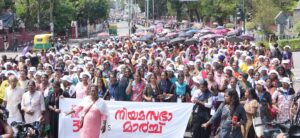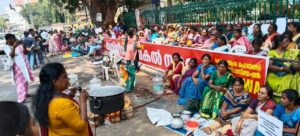Published Mar 06, 2025 | 4:00 PM ⚊ Updated Mar 06, 2025 | 4:00 PM

ASHAs vs. the State: Protests, politics, and the fight for demands
Synopsis: For nearly three weeks, Accredited Social Health Activists (ASHA) have been protesting outside Kerala’s Secretariat, demanding change. The protest has sparked a political storm, with the Opposition accusing the government of neglecting the protesters, while the government blames the Centre. Despite the political backlash, the ASHAs remain resolute, warning that their agitation will intensify until their demands are met.
For nearly three weeks, a determined group of Accredited Social Health Activists (ASHA) has been holding their ground in front of Kerala’s power centre — the state Secretariat in Thiruvananthapuram — voicing a slew of demands.
What began as a protest has now snowballed into a full-blown political storm. The Opposition — UDF and BJP — accuse the CPI(M)-led LDF government of neglecting and undermining the protesters. However, the state government is hitting back with statistics, shifting the onus onto the Union government, claiming the demands can only be addressed at the national level.
Amidst the political crossfire, the ASHAs remain undeterred, showing no signs of backing down. Instead, they have issued a stern warning: Their agitation will only intensify, no matter the obstacles thrown their way.
ASHAs are considered as the backbone of India’s community healthcare system, serving as a vital link between the public health system and local communities.
As trained female health activists selected from within their own villages, ASHAs play a crucial role in promoting healthcare awareness, ensuring immunisation, and facilitating access to maternal and child health services.
In Kerala, their responsibilities go beyond the national framework, extending to areas such as non-communicable disease (NCD) control, palliative care, mental health support, and the prevention of communicable diseases.
Despite a delayed rollout compared to other states, Kerala’s ASHA program has gained remarkable momentum, with 26,125 ASHAs currently serving — 21,529 in rural areas, 4,104 in urban areas, and 492 in tribal regions.
Their unwavering commitment has made them indispensable in strengthening Kerala’s robust healthcare system.
The ongoing protest by ASHA workers in Kerala, under the banner of the Kerala ASHA Health Workers Association (KAHWA) affiliated with SUCI(C), has intensified since 10 February.
Their primary demands include a hike in monthly honorarium from ₹7,000 to ₹21,000, clearance of pending wages, revocation of the retirement age cap of 62, and a lump sum retirement benefit of ₹5 lakh.
While the state government recently cleared pending honorarium and incentives — only after protests — it has firmly rejected the demand for a ₹21,000 honorarium, calling it impractical.
The government also downplayed the strike’s impact, stating that only 2,000 out of Kerala’s 26,125 ASHAs were participating, and that the protest was losing momentum.
Health Minister Veena George emphasised that Kerala offers the highest honorarium to ASHA workers in India.
She pointed out that 89 percent of ASHAs receive between ₹10,000-₹13,500 per month, with ₹9,600 coming from the state.
She also accused the Union government of failing to revise ASHA incentives since the scheme’s inception and withholding ₹100 crore in funds meant for Kerala’s ASHA workers in 2023-24.
She further argued that ASHAs should be regularised as workers under the central scheme, ensuring job security and benefits.
However, the government also remains cautious, fearing that accepting ASHA demands could set a precedent for other contractual workers to demand permanent employee status.

The protest
KAHWA leaders insist that their protest is directed at the state government, which has the power to increase the honorarium and announce retirement benefits.
State Vice President S Mini clarified, “While ASHAs are part of a Central scheme, the state has a responsibility too. If it fails in its duty, we will continue to protest.”
Mini also dismissed accusations of political motivation, highlighting CPI(M)’s double standards.
She pointed out that CITU state general secretary Elamaram Karim — who now opposes the protest — once demanded in the Assembly that ASHAs receive a ₹10,000 honorarium when Oommen Chandy was chief minister.
While Kerala maintains it provides the highest honorarium to ASHAs nationwide, workers argue that the current wages are insufficient.
As the ongoing agitation by ASHA workers entered its 24th day on Tuesday, 4 March, it triggered a heated discussion in the Kerala Assembly.
The issue was raised through an adjournment motion by Congress MLA Rahul Mamkoottathil, who highlighted the workers’ meagre wages.
“For working seven days a week, ASHAs earn just ₹7,000 per month, amounting to a daily wage of ₹232,” he said, demanding an increase to ₹700.
Rahul also criticised the government for engaging ASHAs in official events, asking if ₹232 was sufficient to “listen and clap” at ministers’ meetings.
Comparing their demand with the salary hike given to Kerala PSC members, he pointed out that their wages were recently increased from ₹10,000 to ₹14,538.
Health Minister Veena George countered Rahul’s claims, asserting that she had met the protesters and that ASHAs were not barred from taking up additional jobs.

Protesters near the state Secretariat.
Leader of the Opposition (LoP) in the Kerala Assembly VD Satheesan cited Karnataka’s example, where the chief minister promptly raised ASHA honorariums to ₹10,000 after protests.
Urging similar action in Kerala, he called on Chief Minister Pinarayi Vijayan to meet the agitating workers.
The ongoing protest by ASHA workers in Kerala has turned into a political battleground, with the Congress, BJP, and CPI(M) exchanging heated words over the workers’ demands for better pay and job security.
Congress state President and MP K Sudhakaran lashed out at the Pinarayi Vijayan-led government, accusing it of turning its back on ASHA workers while claiming to be pro-labor.
“The government shows no mercy towards their struggle. These workers aren’t asking for extravagant salaries like those of PSC members or the Kerala government representative in Delhi. They are simply demanding a dignified livelihood, and instead of listening, the government is retaliating. Even the tarpaulin they tied to the pandal to protect themselves from the rain was removed by the police — this is sheer inhumanity,” said Sudhakaran, warning that the Congress and UDF would intensify protests unless the demands are met.
Meanwhile, Satheesan took a sharper jab, accusing the CPI(M) of branding ASHA workers as villains for merely demanding fair wages.
“These workers slog for 12 to 14 hours a day, yet even their meagre honorarium is being cut. The government is pretending not to see their suffering. Is it communism to abuse and threaten striking workers?” he asked.
Satheesan went further, accusing the ruling party of betraying its own ideological roots. “Once, the CPI(M) set fire to a transport bus and burned four people alive during a strike under the Achutha Menon government. Today, the party that once stood for labour rights has morphed into a capitalist, far-right regime under Pinarayi Vijayan,” he charged.
BJP state president K Surendran also came down heavily on the Kerala government, alleging that it is trying to suppress the protest through misinformation and coercion.
“ASHA workers were the backbone of Kerala’s Covid response, yet today, they are being treated like enemies. The state government is spreading false propaganda, blaming the Centre while failing to allocate its own funds for the health sector. Kerala received an additional 16 percent in this year’s Union Budget for health — so where is that money going?” he questioned.
The BJP demanded an immediate increase in the ASHA workers’ honorarium and warned that no amount of propaganda would suppress the protest.
With elections on the horizon, the ASHA workers’ protest has become a litmus test for Kerala’s political parties — each trying to claim the moral high ground while workers continue their fight for justice.
As the strike continues, one question looms large: Will Kerala’s ASHA workers finally get their due, or will their demands remain lost in the political crossfire?
(Edited by Ananya Rao.)

